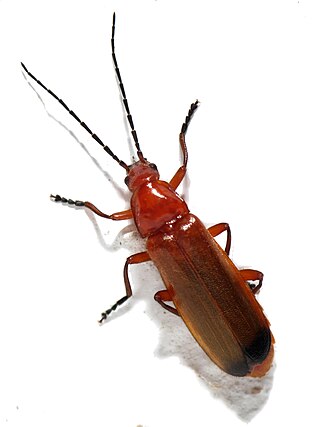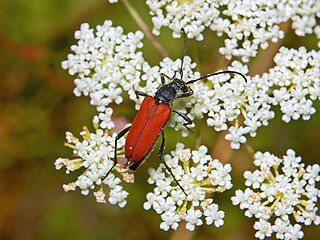
Beetles are insects that form the order Coleoptera, in the superorder Holometabola. Their front pair of wings are hardened into wing-cases, elytra, distinguishing them from most other insects. The Coleoptera, with about 400,000 described species, is the largest of all orders, constituting almost 40% of described insects and 25% of all known animal species; new species are discovered frequently, with estimates suggesting that there are between 0.9 and 2.1 million total species. Found in almost every habitat except the sea and the polar regions, they interact with their ecosystems in several ways: beetles often feed on plants and fungi, break down animal and plant debris, and eat other invertebrates. Some species are serious agricultural pests, such as the Colorado potato beetle, while others such as Coccinellidae eat aphids, scale insects, thrips, and other plant-sucking insects that damage crops. Some others also have unusual characteristics, such as fireflies, which use a light-emitting organ for mating and communication purposes.

The longhorn beetles (Cerambycidae), also known as long-horned or longicorns, are a large family of beetles, with over 35,000 species described.

Phyllophaga is a very large genus of New World scarab beetles in the subfamily Melolonthinae. Common names for this genus and many other related genera in the subfamily Melolonthinae are May beetles, June bugs, and July beetles. They range in size from 12 to 35 mm and are blackish or reddish-brown in colour, without prominent markings, and often rather hairy ventrally. These beetles are nocturnal, and are attracted to artificial lights in great numbers.

The Rosalia longicorn or Alpine longhorn beetle, is a large longicorn that is distinguished by its distinctive markings.

Rhagonycha fulva, the common red soldier beetle, also misleadingly known as the bloodsucker beetle, and popularly known in England as the hogweed bonking beetle is a species of soldier beetle (Cantharidae).

Athous haemorrhoidalis is a species of European and Asian click beetles in the genus Athous. Several variations are recognized.

Chlaenius is a large and diverse genus of ground beetle. It is native to the Palearctic realm, Afrotropical realm, and Nearctic realm. Worldwide, roughly 1,000 species are currently recognized with the majority of known species occurring in the Oriental and Afrotropical regions. The genus is divided into many subgenera.

Chauliognathus is a genus of soldier beetles in the family Cantharidae. Adults have almost rectangular bodies. Some are red and black, similar to the military uniforms that were common before the usage of camouflage, hence the name of soldier beetles. Others are orange and black. The elytra or first pair of wings are softer than the elytra of most beetles, that is why their other common name is leatherwings. The adults are frequently found on flowers, such as sunflowers, goldenrod, coneflowers, where they mate and feed on pollen and nectar. The larvae are more common in the ground or among debris, where they feed on eggs or larvae of other insects. The adults are most frequently found in summer and early fall. They are native to America and Australia.

The Banded Alder Borer, Rosalia funebris, is a member of the very diverse family of longhorn beetles.

Anastrangalia sanguinolenta is a species of flower longhorn beetles belonging to the family Cerambycidae, subfamily Lepturinae.

Rutpela maculata, the spotted longhorn, is a beetle species of flower longhorns of the family Cerambycidae, subfamily Lepturinae.

Stenurella melanura is a flower longhorn beetle species of the family Cerambycidae, subfamily Lepturinae.

Stictoleptura cordigera is a beetle species of flower longhorns belonging to the longhorn beetle family, subfamily Lepturinae.

Anastrangalia is a genus of beetle in the family Cerambycidae, containing the following species:

Typocerus is a genus of beetles in the family Cerambycidae, containing the following species:

Anastrangalia dubia is a species of beetle of family Cerambycidae.

Styloxus fulleri is a species of beetle in the family Cerambycidae. It was described by George Henry Horn in 1880.

Grammoptera ruficornis is a species of beetle in family Cerambycidae.

Lepturini is a tribe of flower longhorns in the family Cerambycidae.

Euphoria inda, the bumble flower beetle, brown fruit chafer or Indian cetonia is a species of beetle in the family Scarabaeidae. It is found in North America. While in flight, adults of this species do not lift their elytra, creating a buzzing sound as the hindwings vibrate inside. The adult beetle is a pollinator and feeds on pollen, nectar, sap and damaged fruits.





















